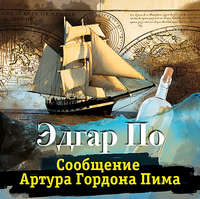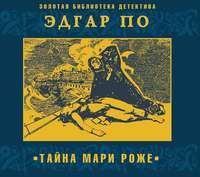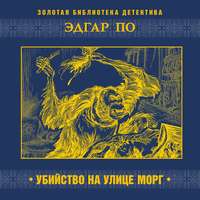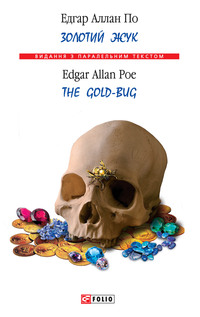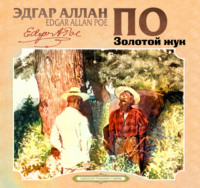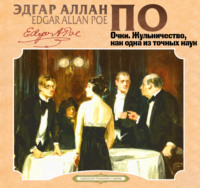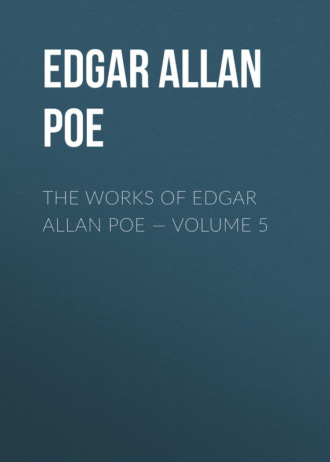 полная версия
полная версияThe Works of Edgar Allan Poe – Volume 5
“You are aware of the great barrier in the path of an American writer. He is read, if at all, in preference to the combined and established wit of the world. I say established; for it is with literature as with law or empire-an established name is an estate in tenure, or a throne in possession. Besides, one might suppose that books, like their authors, improve by travel-their having crossed the sea is, with us, so great a distinction. Our antiquaries abandon time for distance; our very fops glance from the binding to the bottom of the title-page, where the mystic characters which spell London, Paris, or Genoa, are precisely so many letters of recommendation.
“I mentioned just now a vulgar error as regards criticism. I think the notion that no poet can form a correct estimate of his own writings is another. I remarked before that in proportion to the poetical talent would be the justice of a critique upon poetry. Therefore a bad poet would, I grant, make a false critique, and his self-love would infallibly bias his little judgment in his favor; but a poet, who is indeed a poet, could not, I think, fail of making-a just critique; whatever should be deducted on the score of self-love might be replaced on account of his intimate acquaintance with the subject; in short, we have more instances of false criticism than of just where one’s own writings are the test, simply because we have more bad poets than good. There are, of course, many objections to what I say: Milton is a great example of the contrary; but his opinion with respect to the ‘Paradise Regained’ is by no means fairly ascertained. By what trivial circumstances men are often led to assert what they do not really believe! Perhaps an inadvertent word has descended to posterity. But, in fact, the ‘Paradise Regained’ is little, if at all, inferior to the ‘Paradise Lost,’ and is only supposed so to be because men do not like epics, whatever they may say to the contrary, and, reading those of Milton in their natural order, are too much wearied with the first to derive any pleasure from the second.
“I dare say Milton preferred ‘Comus’ to either-. if so-justly.
“As I am speaking of poetry, it will not be amiss to touch slightly upon the most singular heresy in its modern history-the heresy of what is called, very foolishly, the Lake School. Some years ago I might have been induced, by an occasion like the present, to attempt a formal refutation of their doctrine; at present it would be a work of supererogation. The wise must bow to the wisdom of such men as Coleridge and Southey, but, being wise, have laughed at poetical theories so prosaically exemplifled.
“Aristotle, with singular assurance, has declared poetry the most philosophical of all writings*-but it required a Wordsworth to pronounce it the most metaphysical. He seems to think that the end of poetry is, or should be, instruction; yet it is a truism that the end of our existence is happiness; if so, the end of every separate part of our existence, everything connected with our existence, should be still happiness. Therefore the end of instruction should be happiness; and happiness is another name for pleasure; – therefore the end of instruction should be pleasure: yet we see the above-mentioned opinion implies precisely the reverse.
“To proceed: ceteris paribus, he who pleases is of more importance to his fellow-men than he who instructs, since utility is happiness, and pleasure is the end already obtained which instruction is merely the means of obtaining.
“I see no reason, then, why our metaphysical poets should plume themselves so much on the utility of their works, unless indeed they refer to instruction with eternity in view; in which case, sincere respect for their piety would not allow me to express my contempt for their judgment; contempt which it would be difficult to conceal, since their writings are professedly to be understood by the few, and it is the many who stand in need of salvation. In such case I should no doubt be tempted to think of the devil in ‘Melmoth.’ who labors indefatigably, through three octavo volumes, to accomplish the destruction of one or two souls, while any common devil would have demolished one or two thousand.
“Against the subtleties which would make poetry a study-not a passion-it becomes the metaphysician to reason-but the poet to protest.
Yet Wordsworth and Coleridge are men in years; the one imbued in contemplation from his childhood; the other a giant in intellect and learning. The diffidence, then, with which I venture to dispute their authority would be overwhelming did I not feel, from the bottom of my heart, that learning has little to do with the imagination-intellect with the passions-or age with poetry.
“‘Trifles, like straws, upon the surface flow; He who would search for pearls must dive below,’are lines which have done much mischief. As regards the greater truths, men oftener err by seeking them at the bottom than at the top; Truth lies in the huge abysses where wisdom is sought-not in the palpable palaces where she is found. The ancients were not always right in hiding – the goddess in a well; witness the light which Bacon has thrown upon philosophy; witness the principles of our divine faith – that moral mechanism by which the simplicity of a child may overbalance the wisdom of a man.
“We see an instance of Coleridge’s liability to err, in his ‘Biographia Literaria’ – professedly his literary life and opinions, but, in fact, a treatise de omni scibili et quibusdam aliis. He goes wrong by reason of his very profundity, and of his error we have a natural type in the contemplation of a star. He who regards it directly and intensely sees, it is true, the star, but it is the star without a ray-while he who surveys it less inquisitively is conscious of all for which the star is useful to us below-its brilliancy and its beauty.
“As to Wordsworth, I have no faith in him. That he had in youth the feelings of a poet I believe-for there are glimpses of extreme delicacy in his writings-(and delicacy is the poet’s own kingdom-his El Dorado) – but they have the appearance of a better day recollected; and glimpses, at best, are little evidence of present poetic fire; we know that a few straggling flowers spring up daily in the crevices of the glacier.
“He was to blame in wearing away his youth in contemplation with the end of poetizing in his manhood. With the increase of his judgment the light which should make it apparent has faded away. His judgment consequently is too correct. This may not be understood-but the old Goths of Germany would have understood it, who used to debate matters of importance to their State twice, once when drunk, and once when sober-sober that they might not be deficient in formality – drunk lest they should be destitute of vigor.
“The long wordy discussions by which he tries to reason us into admiration of his poetry, speak very little in his favor: they are full of such assertions as this (I have opened one of his volumes at random) – ‘Of genius the only proof is the act of doing well what is worthy to be done, and what was never done before;’-indeed? then it follows that in doing what is unworthy to be done, or what has been done before, no genius can be evinced; yet the picking of pockets is an unworthy act, pockets have been picked time immemorial, and Barrington, the pickpocket, in point of genius, would have thought hard of a comparison with William Wordsworth, the poet.
“Again, in estimating the merit of certain poems, whether they be Ossian’s or Macpherson’s can surely be of little consequence, yet, in order to prove their worthlessness, Mr. W. has expended many pages in the controversy. Tantaene animis? Can great minds descend to such absurdity? But worse still: that he may bear down every argument in favor of these poems, he triumphantly drags forward a passage, in his abomination with which he expects the reader to sympathize. It is the beginning of the epic poem ‘Temora.’ ‘The blue waves of Ullin roll in light; the green hills are covered with day; trees shake their dusty heads in the breeze.’ And this this gorgeous, yet simple imagery, where all is alive and panting with immortality-this, William Wordsworth, the author of ‘Peter Bell,’ has selected for his contempt. We shall see what better he, in his own person, has to offer. Imprimis:
“‘And now she’s at the pony’s tail, And now she’s at the pony’s head, On that side now, and now on this; And, almost stifled with her bliss, A few sad tears does Betty shed… She pats the pony, where or when She knows not… happy Betty Foy! Oh, Johnny, never mind the doctor!’Secondly:
“‘The dew was falling fast, the-stars began to blink; I heard a voice: it said-“Drink, pretty creature, drink!” And, looking o’er the hedge, be-fore me I espied A snow-white mountain lamb, with a-maiden at its side. No other sheep was near, – the lamb was all alone, And by a slender cord was-tether’d to a stone.’“Now, we have no doubt this is all true: we will believe it, indeed we will, Mr. W. Is it sympathy for the sheep you wish to excite? I love a sheep from the bottom of my heart.
“But there are occasions, dear B-, there are occasions when even Wordsworth is reasonable. Even Stamboul, it is said, shall have an end, and the most unlucky blunders must come to a conclusion. Here is an extract from his preface: -
“‘Those who have been accustomed to the phraseology of modem writers, if they persist in reading this book to a conclusion (impossible!) will, no doubt, have to struggle with feelings of awkwardness; (ha! ha! ha!) they will look round for poetry (ha! ha! ha! ha!), and will be induced to inquire by what species of courtesy these attempts have been permitted to assume that title.’ Ha! ha! ha! ha! ha!
“Yet, let not Mr. W. despair; he has given immortality to a wagon, and the bee Sophocles has transmitted to eternity a sore toe, and dignified a tragedy with a chorus of turkeys.
“Of Coleridge, I can not speak but with reverence. His towering intellect! his gigantic power! To use an author quoted by himself, ‘Tai trouvé souvent que la plupart des sectes ont raison dans une bonne partie de ce qu’elles avancent, mais non pas en ce qu’elles nient,’ and to employ his own language, he has imprisoned his own conceptions by the barrier he has erected against those of others. It is lamentable to think that such a mind should be buried in metaphysics, and, like the Nyctanthes, waste its perfume upon the night alone. In reading that man’s poetry, I tremble like one who stands upon a volcano, conscious from the very darkness bursting from the crater, of the fire and the light that are weltering below.
“What is poetry? – Poetry! that Proteus-like idea, with as many appellations as the nine-titled Corcyra! ‘Give me,’ I demanded of a scholar some time ago, ‘give me a definition of poetry.’ ‘Trèsvolontiers;’ and he proceeded to his library, brought me a Dr. Johnson, and overwhelmed me with a definition. Shade of the immortal Shakespeare! I imagine to myself the scowl of your spiritual eye upon the profanity of that scurrilous Ursa Major. Think of poetry, dear B-, think of poetry, and then think of Dr. Samuel Johnson! Think of all that is airy and fairy-like, and then of all that is hideous and unwieldy; think of his huge bulk, the Elephant! and then-and then think of the ‘Tempest’ – the ‘Midsummer-Night’s Dream’ – Prospero Oberon – and Titania!
“A poem, in my opinion, is opposed to a work of science by having, for its immediate object, pleasure, not truth; to romance, by having, for its object, an indefinite instead of a definite pleasure, being a poem only so far as this object is attained; romance presenting perceptible images with definite, poetry with indefinite sensations, to which end music is an essential, since the comprehension of sweet sound is our most indefinite conception. Music, when combined with a pleasurable idea, is poetry; music, without the idea, is simply music; the idea, wi thout the music, is prose, from its very definitiveness.
“What was meant by the invective against him who had no music in his soul?
“To sum up this long rigmarole, I have, dear B – , what you, no doubt, perceive, for the metaphysical poets as poets, the most sovereign contempt. That they have followers proves nothing-
“‘No Indian prince has to his palace More followers than a thief to the gallows.SONNET – TO SCIENCE
SCIENCE! true daughter of Old Time thou art! Who alterest all things with thy peering eyes. Why preyest thou thus upon the poet’s heart, Vulture, whose wings are dull realities? How should he love thee? or how deem thee wise, Who wouldst not leave him in his wandering To seek for treasure in the jewelled skies Albeit he soared with an undaunted wing? Hast thou not dragged Diana from her car? And driven the Hamadryad from the wood To seek a shelter in some happier star? Hast thous not torn the Naiad from her flood, The Elfin from the green grass, and from me The summer dream beneath the tamarind tree?AL AARAAF6
PART I O! NOTHING earthly save the ray (Thrown back from flowers) of Beauty’s eye, As in those gardens where the day Springs from the gems of Circassy — O! nothing earthly save the thrill Of melody in woodland rill — Or (music of the passion-hearted) Joy’s voice so peacefully departed That like the murmur in the shell, Its echo dwelleth and will dwell — Oh, nothing of the dross of ours — Yet all the beauty – all the flowers That list our Love, and deck our bowers — Adorn yon world afar, afar — The wandering star. ‘Twas a sweet time for Nesace – for there Her world lay lolling on the golden air, Near four bright suns – a temporary rest — An oasis in desert of the blest. Away – away – ‘mid seas of rays that roll Empyrean splendor o’er th’ unchained soul — The soul that scarce (the billows are so dense) Can struggle to its destin’d eminence — To distant spheres, from time to time, she rode, And late to ours, the favour’d one of God — But, now, the ruler of an anchor’d realm, She throws aside the sceptre – leaves the helm, And, amid incense and high spiritual hymns, Laves in quadruple light her angel limbs. Now happiest, loveliest in yon lovely Earth, Whence sprang the “Idea of Beauty” into birth, (Falling in wreaths thro’ many a startled star, Like woman’s hair ‘mid pearls, until, afar, It lit on hills Achaian, and there dwelt) She look’d into Infinity – and knelt. Rich clouds, for canopies, about her curled — Fit emblems of the model of her world — Seen but in beauty – not impeding sight Of other beauty glittering thro’ the light — A wreath that twined each starry form around, And all the opal’d air in color bound. All hurriedly she knelt upon a bed Of flowers: of lilies such as rear’d the head 7On the fair Capo Deucato, and sprang So eagerly around about to hang Upon the flying footsteps of – deep pride — 8Of her who lov’d a mortal – and so died. The Sephalica, budding with young bees, Uprear’d its purple stem around her knees: 9 On Santa Maura – olim Deucadia. 10And gemmy flower, of Trebizond misnam’d — Inmate of highest stars, where erst it sham’d All other loveliness: its honied dew (The fabled nectar that the heathen knew) Deliriously sweet, was dropp’d from Heaven, And fell on gardens of the unforgiven In Trebizond – and on a sunny flower So like its own above that, to this hour, It still remaineth, torturing the bee With madness, and unwonted reverie: In Heaven, and all its environs, the leaf And blossom of the fairy plant, in grief Disconsolate linger – grief that hangs her head, Repenting follies that full long have fled, Heaving her white breast to the balmy air, Like guilty beauty, chasten’d, and more fair: Nyctanthes too, as sacred as the light She fears to perfume, perfuming the night: 11And Clytia pondering between many a sun, While pettish tears adown her petals run: 12And that aspiring flower that sprang on Earth — And died, ere scarce exalted into birth, Bursting its odorous heart in spirit to wing Its way to Heaven, from garden of a king: 13And Valisnerian lotus thither flown From struggling with the waters of the Rhone: 14And thy most lovely purple perfume, Zante! Isola d’oro! – Fior di Levante! 15And the Nelumbo bud that floats for ever With Indian Cupid down the holy river — Fair flowers, and fairy! to whose care is given 16To bear the Goddess’ song, in odors, up to Heaven: “Spirit! that dwellest where, In the deep sky, The terrible and fair, In beauty vie! Beyond the line of blue — The boundary of the star Which turneth at the view Of thy barrier and thy bar — Of the barrier overgone By the comets who were cast From their pride, and from their throne To be drudges till the last — To be carriers of fire (The red fire of their heart) With speed that may not tire And with pain that shall not part — Who livest —that we know — In Eternity – we feel — But the shadow of whose brow What spirit shall reveal? Tho’ the beings whom thy Nesace, Thy messenger hath known Have dream’d for thy Infinity 17A model of their own — Thy will is done, Oh, God! The star hath ridden high Thro’ many a tempest, but she rode Beneath thy burning eye; And here, in thought, to thee — In thought that can alone Ascend thy empire and so be A partner of thy throne — 18By winged Fantasy, My embassy is given, Till secrecy shall knowledge be In the environs of Heaven.” She ceas’d – and buried then her burning cheek Abash’d, amid the lilies there, to seek A shelter from the fervour of His eye; For the stars trembled at the Deity. She stirr’d not – breath’d not – for a voice was there How solemnly pervading the calm air! A sound of silence on the startled ear Which dreamy poets name “the music of the sphere.” Ours is a world of words: Quiet we call “Silence” – which is the merest word of all. All Nature speaks, and ev’n ideal things Flap shadowy sounds from visionary wings — But ah! not so when, thus, in realms on high The eternal voice of God is passing by, And the red winds are withering in the sky! 19“What tho’ in worlds which sightless cycles run, Link’d to a little system, and one sun — Where all my love is folly and the crowd Still think my terrors but the thunder cloud, The storm, the earthquake, and the ocean-wrath — (Ah! will they cross me in my angrier path?) What tho’ in worlds which own a single sun The sands of Time grow dimmer as they run, Yet thine is my resplendency, so given To bear my secrets thro’ the upper Heaven. Leave tenantless thy crystal home, and fly, With all thy train, athwart the moony sky — 20Apart – like fire-flies in Sicilian night, And wing to other worlds another light! Divulge the secrets of thy embassy To the proud orbs that twinkle – and so be To ev’ry heart a barrier and a ban Lest the stars totter in the guilt of man!” Up rose the maiden in the yellow night, The single-mooned eve! – on Earth we plight Our faith to one love – and one moon adore — The birth-place of young Beauty had no more. As sprang that yellow star from downy hours Up rose the maiden from her shrine of flowers, And bent o’er sheeny mountain and dim plain 21Her way – but left not yet her Therasæan reign.Part II HIGH on a mountain of enamell’d head — Such as the drowsy shepherd on his bed Of giant pasturage lying at his ease, Raising his heavy eyelid, starts and sees With many a mutter’d “hope to be forgiven” What time the moon is quadrated in Heaven — Of rosy head, that towering far away Into the sunlit ether, caught the ray Of sunken suns at eve – at noon of night, While the moon danc’d with the fair stranger light — Uprear’d upon such height arose a pile Of gorgeous columns on th’ unburthen’d air, Flashing from Parian marble that twin smile Far down upon the wave that sparkled there, And nursled the young mountain in its lair. 22Of molten stars their pavement, such as fall Thro’ the ebon air, besilvering the pall Of their own dissolution, while they die — Adorning then the dwellings of the sky. A dome, by linked light from Heaven let down, Sat gently on these columns as a crown — A window of one circular diamond, there, Look’d out above into the purple air, And rays from God shot down that meteor chain And hallow’d all the beauty twice again, Save when, between th’ Empyrean and that ring, Some eager spirit flapp’d his dusky wing. But on the pillars Seraph eyes have seen The dimness of this world: that greyish green That Nature loves the best for Beauty’s grave Lurk’d in each cornice, round each architrave — And every sculptur’d cherub thereabout That from his marble dwelling peeréd out Seem’d earthly in the shadow of his niche — Achaian statues in a world so rich? 23Friezes from Tadmor and Persepolis — From Balbec, and the stilly, clear abyss 24Of beautiful Gomorrah! O, the wave Is now upon thee – but too late to save! Sound loves to revel in a summer night: Witness the murmur of the grey twilight 25That stole upon the ear, in Eyraco, Of many a wild star-gazer long ago — That stealeth ever on the ear of him Who, musing, gazeth on the distance dim. And sees the darkness coming as a cloud — 26Is not its form – its voice – most palpable and loud? But what is this? – it cometh – and it brings A music with it – ‘tis the rush of wings — A pause – and then a sweeping, falling strain And Nesace is in her halls again. From the wild energy of wanton haste Her cheeks were flushing, and her lips apart; And zone that clung around her gentle waist Had burst beneath the heaving of her heart. Within the centre of that hall to breathe She paus’d and panted, Zanthe! all beneath, The fairy light that kiss’d her golden hair And long’d to rest, yet could but sparkle there! 27Young flowers were whispering in melody To happy flowers that night – and tree to tree; Fountains were gushing music as they fell In many a star-lit grove, or moon-lit dell; Yet silence came upon material things — Fair flowers, bright waterfalls and angel wings — And sound alone that from the spirit sprang Bore burthen to the charm the maiden sang: “‘Neath blue-bell or streamer — Or tufted wild spray That keeps, from the dreamer, 28The moonbeam away — Bright beings! that ponder, With half closing eyes, On the stars which your wonder Hath drawn from the skies, Till they glance thro’ the shade, and Come down to your brow Like – eyes of the maiden Who calls on you now — Arise! from your dreaming In violet bowers, To duty beseeming These star-litten hours — And shake from your tresses Encumber’d with dew The breath of those kisses That cumber them too — (O! how, without you, Love! Could angels be blest?) Those kisses of true love That lull’d ye to rest! Up! – shake from your wing Each hindering thing: The dew of the night — It would weigh down your flight; And true love caresses — O! leave them apart! They are light on the tresses, But lead on the heart. Ligeia! Ligeia! My beautiful one! Whose harshest idea Will to melody run, O! is it thy will On the breezes to toss? Or, capriciously still, 29Like the lone Albatross, Incumbent on night (As she on the air) To keep watch with delight On the harmony there? Ligeia! whatever Thy image may be, No magic shall sever Thy music from thee. Thou hast bound many eyes In a dreamy sleep — But the strains still arise Which thy vigilance keep — The sound of the rain Which leaps down to the flower, And dances again In the rhythm of the shower — 30The murmur that springs From the growing of grass Are the music of things — But are modell’d, alas! — Away, then my dearest, O! hie thee away To springs that lie clearest Beneath the moon-ray — To lone lake that smiles, In its dream of deep rest, At the many star-isles That enjewel its breast — Where wild flowers, creeping, Have mingled their shade, On its margin is sleeping Full many a maid — Some have left the cool glade, and 31 Have slept with the bee — Arouse them my maiden, On moorland and lea — Go! breathe on their slumber, All softly in ear, The musical number They slumber’d to hear — For what can awaken An angel so soon Whose sleep hath been taken Beneath the cold moon, As the spell which no slumber Of witchery may test, The rythmical number Which lull’d him to rest?” Spirits in wing, and angels to the view, A thousand seraphs burst th’ Empyrean thro’, Young dreams still hovering on their drowsy flight — Seraphs in all but “Knowledge,” the keen light That fell, refracted, thro’ thy bounds, afar O Death! from eye of God upon that star: Sweet was that error – sweeter still that death — Sweet was that error – ev’n with us the breath Of science dims the mirror of our joy — To them ‘twere the Simoom, and would destroy — For what (to them) availeth it to know That Truth is Falsehood – or that Bliss is Woe? Sweet was their death – with them to die was rife With the last ecstacy of satiate life — Beyond that death no immortality — But sleep that pondereth and is not “to be” — And there – oh! may my weary spirit dwell —32Apart from Heaven’s Eternity – and yet how far from Hell! What guilty spirit, in what shrubbery dim, Heard not the stirring summons of that hymn? But two: they fell: for Heaven no grace imparts To those who hear not for their beating hearts. A maiden-angel and her seraph-lover — O! where (and ye may seek the wide skies over) Was Love, the blind, near sober Duty known?33Unguided Love hath fallen – ‘mid “tears of perfect moan.” He was a goodly spirit – he who fell: A wanderer by moss-y-mantled well — A gazer on the lights that shine above — A dreamer in the moonbeam by his love: What wonder? For each star is eye-like there, And looks so sweetly down on Beauty’s hair — And they, and ev’ry mossy spring were holy To his love-haunted heart and melancholy. The night had found (to him a night of wo) Upon a mountain crag, young Angelo — Beetling it bends athwart the solemn sky, And scowls on starry worlds that down beneath it lie. Here sate he with his love – his dark eye bent With eagle gaze along the firmament: Now turn’d it upon her – but ever then It trembled to the orb of EARTH again. “Iante, dearest, see! how dim that ray! How lovely ‘tis to look so far away! She seem’d not thus upon that autumn eve I left her gorgeous halls – nor mourn’d to leave. That eve – that eve – I should remember well — The sun-ray dropp’d, in Lemnos, with a spell On th’Arabesque carving of a gilded hall Wherein I sate, and on the draperied wall — And on my eye-lids – O the heavy light! How drowsily it weigh’d them into night! On flowers, before, and mist, and love they ran With Persian Saadi in his Gulistan: But O that light! – I slumber’d – Death, the while, Stole o’er my senses in that lovely isle So softly that no single silken hair Awoke that slept – or knew that it was there. The last spot of Earth’s orb I trod upon 34Was a proud temple call’d the Parthenon — More beauty clung around her column’d wall 35Than ev’n thy glowing bosom beats withal, And when old Time my wing did disenthral Thence sprang I – as the eagle from his tower, And years I left behind me in an hour. What time upon her airy bounds I hung One half the garden of her globe was flung Unrolling as a chart unto my view — Tenantless cities of the desert too! Ianthe, beauty crowded on me then, And half I wish’d to be again of men.” “My Angelo! and why of them to be? A brighter dwelling-place is here for thee — And greener fields than in yon world above, And women’s loveliness – and passionate love.” “But, list, Ianthe! when the air so soft 36Fail’d, as my pennon’d spirit leapt aloft, Perhaps my brain grew dizzy – but the world I left so late was into chaos hurl’d — Sprang from her station, on the winds apart, And roll’d, a flame, the fiery Heaven athwart. Methought, my sweet one, then I ceased to soar And fell – not swiftly as I rose before, But with a downward, tremulous motion thro’ Light, brazen rays, this golden star unto! Nor long the measure of my falling hours, For nearest of all stars was thine to ours — Dread star! that came, amid a night of mirth, A red Dædalion on the timid Earth. “We came – and to thy Earth – but not to us Be given our lady’s bidding to discuss: We came, my love; around, above, below, Gay fire-fly of the night we come and go, Nor ask a reason save the angel-nod She grants to us, as granted by her God — But, Angelo, than thine grey Time unfurl’d Never his fairy wing o’er fairier world! Dim was its little disk, and angel eyes Alone could see the phantom in the skies, When first Al Aaraaf knew her course to be Headlong thitherward o’er the starry sea — But when its glory swell’d upon the sky, As glowing Beauty’s bust beneath man’s eye, We paus’d before the heritage of men, And thy star trembled – as doth Beauty then!” Thus, in discourse, the lovers whiled away The night that waned and waned and brought no day. They fell: for Heaven to them no hope imparts Who hear not for the beating of their hearts.



